Dementia: Impact, Epidemiology, Policy Documents and NHS Forward View
VerifiedAdded on 2021/01/01
|12
|4098
|115
Essay
AI Summary
This essay provides a comprehensive overview of dementia, defining it as a decline in mental ability impacting daily life, with a focus on the UK context. It explores the epidemiology of dementia, highlighting its prevalence, the impact on individuals, and the financial burden on the NHS. The essay delves into the NHS's Five Year Forward View and the Challenge on Dementia 2020, outlining the strategic goals and policy initiatives aimed at improving dementia care, research, and support. It discusses key aspects such as risk reduction, health and care coordination, and the importance of well-being for both patients and caregivers, while also addressing the need for increased funding and research to combat the disease. The essay examines the role of GPs, the importance of public awareness, and the commitment to improving post-diagnostic support and care pathways. Furthermore, it links these initiatives to the broader goal of creating a sustainable and effective healthcare system that addresses the growing challenges of an aging population and the increasing prevalence of dementia.
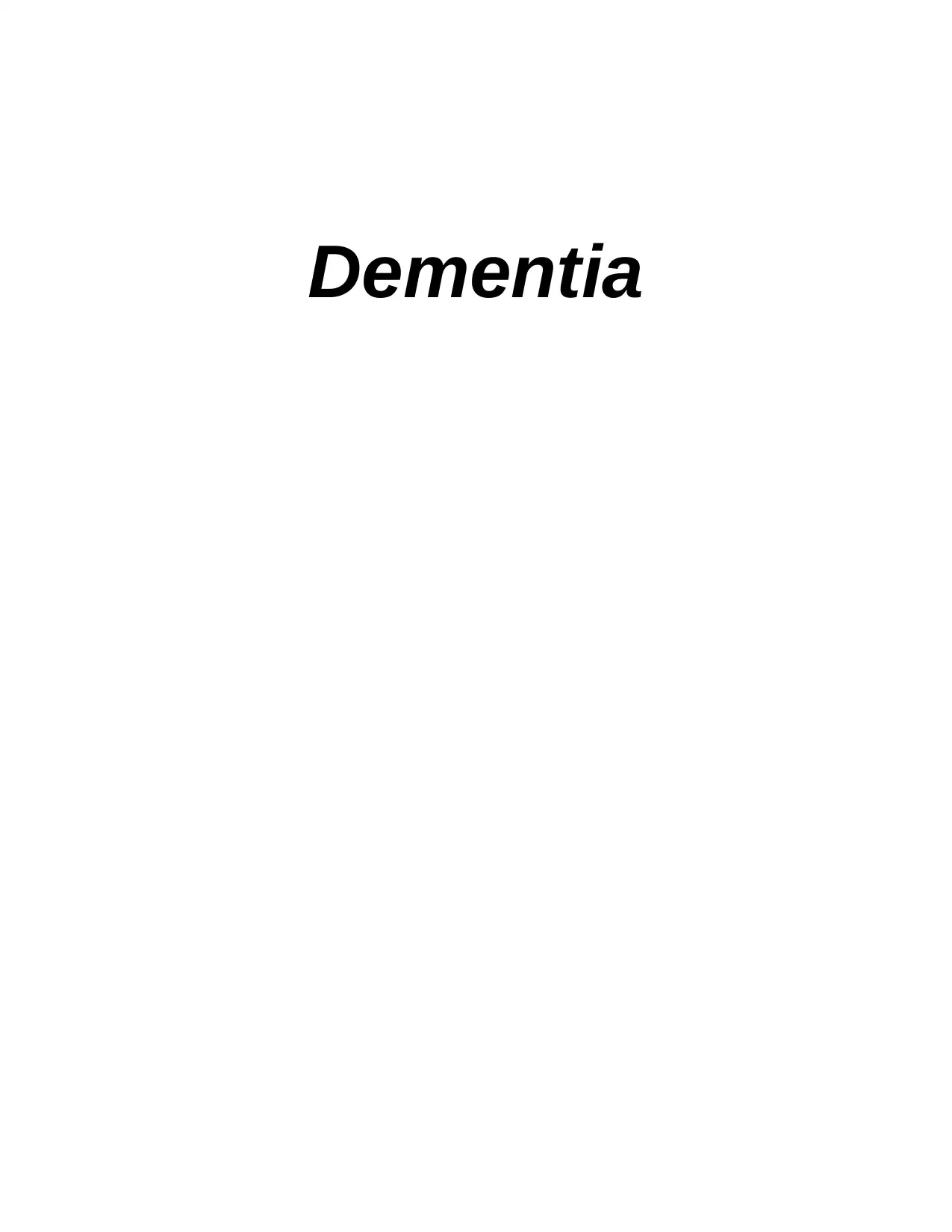
Dementia
Paraphrase This Document
Need a fresh take? Get an instant paraphrase of this document with our AI Paraphraser

Table of Contents
INTRODUCTION...........................................................................................................................1
DISCUSSION.................................................................................................................................1
CONCLUSION...............................................................................................................................9
REFERENCES............................................................................................................................10
CONCLUSION Concepts of determinant of dementia..........................................................10
INTRODUCTION...........................................................................................................................1
DISCUSSION.................................................................................................................................1
CONCLUSION...............................................................................................................................9
REFERENCES............................................................................................................................10
CONCLUSION Concepts of determinant of dementia..........................................................10
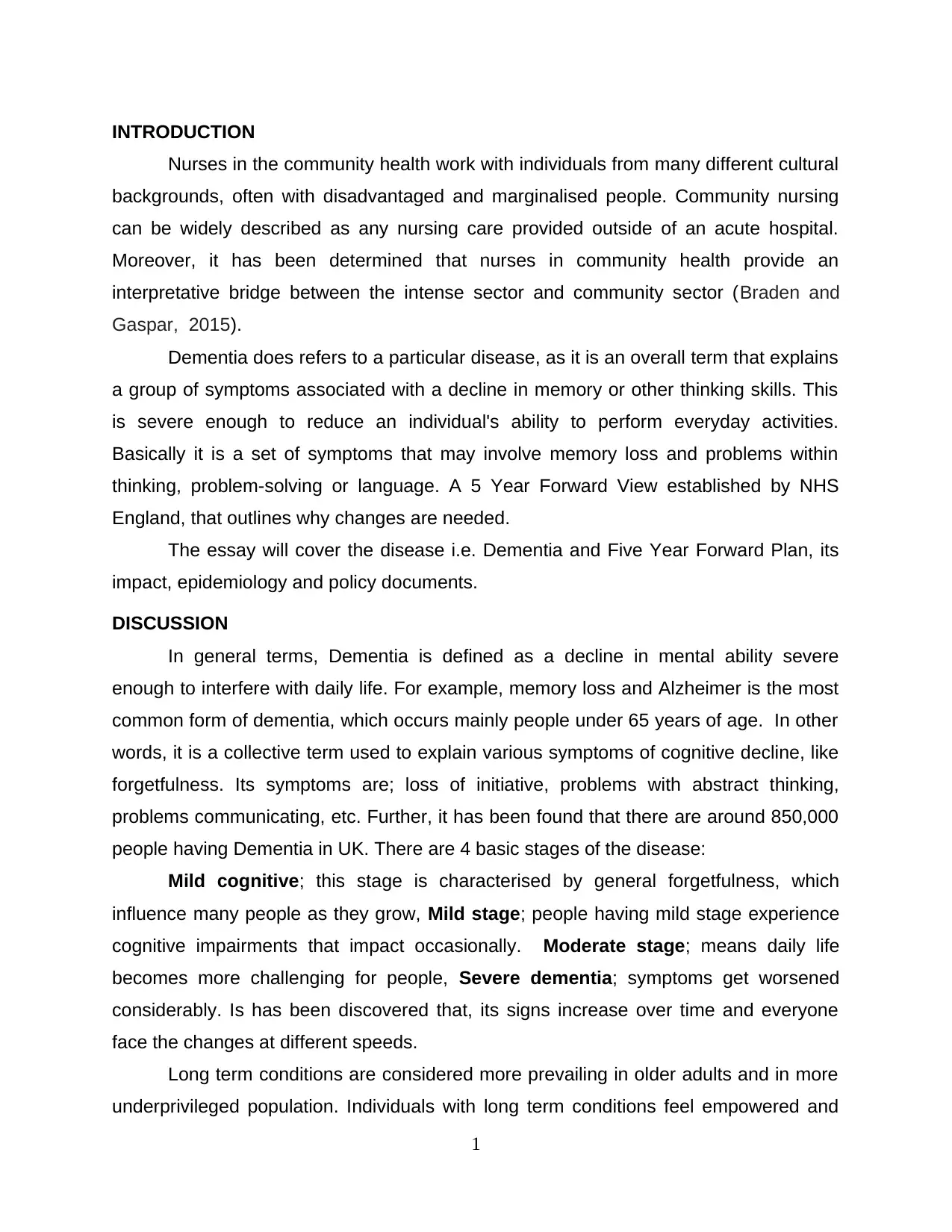
INTRODUCTION
Nurses in the community health work with individuals from many different cultural
backgrounds, often with disadvantaged and marginalised people. Community nursing
can be widely described as any nursing care provided outside of an acute hospital.
Moreover, it has been determined that nurses in community health provide an
interpretative bridge between the intense sector and community sector (Braden and
Gaspar, 2015).
Dementia does refers to a particular disease, as it is an overall term that explains
a group of symptoms associated with a decline in memory or other thinking skills. This
is severe enough to reduce an individual's ability to perform everyday activities.
Basically it is a set of symptoms that may involve memory loss and problems within
thinking, problem-solving or language. A 5 Year Forward View established by NHS
England, that outlines why changes are needed.
The essay will cover the disease i.e. Dementia and Five Year Forward Plan, its
impact, epidemiology and policy documents.
DISCUSSION
In general terms, Dementia is defined as a decline in mental ability severe
enough to interfere with daily life. For example, memory loss and Alzheimer is the most
common form of dementia, which occurs mainly people under 65 years of age. In other
words, it is a collective term used to explain various symptoms of cognitive decline, like
forgetfulness. Its symptoms are; loss of initiative, problems with abstract thinking,
problems communicating, etc. Further, it has been found that there are around 850,000
people having Dementia in UK. There are 4 basic stages of the disease:
Mild cognitive; this stage is characterised by general forgetfulness, which
influence many people as they grow, Mild stage; people having mild stage experience
cognitive impairments that impact occasionally. Moderate stage; means daily life
becomes more challenging for people, Severe dementia; symptoms get worsened
considerably. Is has been discovered that, its signs increase over time and everyone
face the changes at different speeds.
Long term conditions are considered more prevailing in older adults and in more
underprivileged population. Individuals with long term conditions feel empowered and
1
Nurses in the community health work with individuals from many different cultural
backgrounds, often with disadvantaged and marginalised people. Community nursing
can be widely described as any nursing care provided outside of an acute hospital.
Moreover, it has been determined that nurses in community health provide an
interpretative bridge between the intense sector and community sector (Braden and
Gaspar, 2015).
Dementia does refers to a particular disease, as it is an overall term that explains
a group of symptoms associated with a decline in memory or other thinking skills. This
is severe enough to reduce an individual's ability to perform everyday activities.
Basically it is a set of symptoms that may involve memory loss and problems within
thinking, problem-solving or language. A 5 Year Forward View established by NHS
England, that outlines why changes are needed.
The essay will cover the disease i.e. Dementia and Five Year Forward Plan, its
impact, epidemiology and policy documents.
DISCUSSION
In general terms, Dementia is defined as a decline in mental ability severe
enough to interfere with daily life. For example, memory loss and Alzheimer is the most
common form of dementia, which occurs mainly people under 65 years of age. In other
words, it is a collective term used to explain various symptoms of cognitive decline, like
forgetfulness. Its symptoms are; loss of initiative, problems with abstract thinking,
problems communicating, etc. Further, it has been found that there are around 850,000
people having Dementia in UK. There are 4 basic stages of the disease:
Mild cognitive; this stage is characterised by general forgetfulness, which
influence many people as they grow, Mild stage; people having mild stage experience
cognitive impairments that impact occasionally. Moderate stage; means daily life
becomes more challenging for people, Severe dementia; symptoms get worsened
considerably. Is has been discovered that, its signs increase over time and everyone
face the changes at different speeds.
Long term conditions are considered more prevailing in older adults and in more
underprivileged population. Individuals with long term conditions feel empowered and
1
⊘ This is a preview!⊘
Do you want full access?
Subscribe today to unlock all pages.

Trusted by 1+ million students worldwide
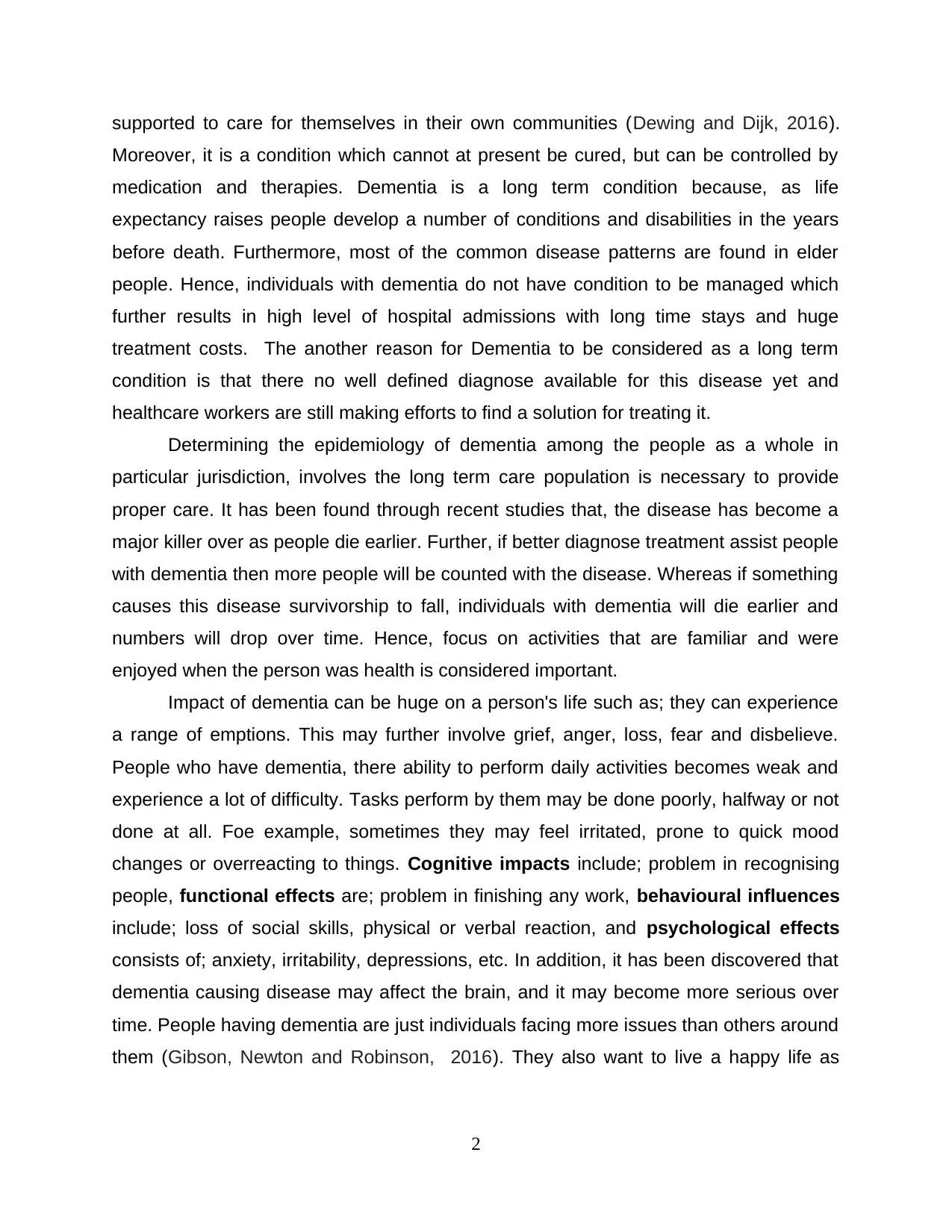
supported to care for themselves in their own communities (Dewing and Dijk, 2016).
Moreover, it is a condition which cannot at present be cured, but can be controlled by
medication and therapies. Dementia is a long term condition because, as life
expectancy raises people develop a number of conditions and disabilities in the years
before death. Furthermore, most of the common disease patterns are found in elder
people. Hence, individuals with dementia do not have condition to be managed which
further results in high level of hospital admissions with long time stays and huge
treatment costs. The another reason for Dementia to be considered as a long term
condition is that there no well defined diagnose available for this disease yet and
healthcare workers are still making efforts to find a solution for treating it.
Determining the epidemiology of dementia among the people as a whole in
particular jurisdiction, involves the long term care population is necessary to provide
proper care. It has been found through recent studies that, the disease has become a
major killer over as people die earlier. Further, if better diagnose treatment assist people
with dementia then more people will be counted with the disease. Whereas if something
causes this disease survivorship to fall, individuals with dementia will die earlier and
numbers will drop over time. Hence, focus on activities that are familiar and were
enjoyed when the person was health is considered important.
Impact of dementia can be huge on a person's life such as; they can experience
a range of emptions. This may further involve grief, anger, loss, fear and disbelieve.
People who have dementia, there ability to perform daily activities becomes weak and
experience a lot of difficulty. Tasks perform by them may be done poorly, halfway or not
done at all. Foe example, sometimes they may feel irritated, prone to quick mood
changes or overreacting to things. Cognitive impacts include; problem in recognising
people, functional effects are; problem in finishing any work, behavioural influences
include; loss of social skills, physical or verbal reaction, and psychological effects
consists of; anxiety, irritability, depressions, etc. In addition, it has been discovered that
dementia causing disease may affect the brain, and it may become more serious over
time. People having dementia are just individuals facing more issues than others around
them (Gibson, Newton and Robinson, 2016). They also want to live a happy life as
2
Moreover, it is a condition which cannot at present be cured, but can be controlled by
medication and therapies. Dementia is a long term condition because, as life
expectancy raises people develop a number of conditions and disabilities in the years
before death. Furthermore, most of the common disease patterns are found in elder
people. Hence, individuals with dementia do not have condition to be managed which
further results in high level of hospital admissions with long time stays and huge
treatment costs. The another reason for Dementia to be considered as a long term
condition is that there no well defined diagnose available for this disease yet and
healthcare workers are still making efforts to find a solution for treating it.
Determining the epidemiology of dementia among the people as a whole in
particular jurisdiction, involves the long term care population is necessary to provide
proper care. It has been found through recent studies that, the disease has become a
major killer over as people die earlier. Further, if better diagnose treatment assist people
with dementia then more people will be counted with the disease. Whereas if something
causes this disease survivorship to fall, individuals with dementia will die earlier and
numbers will drop over time. Hence, focus on activities that are familiar and were
enjoyed when the person was health is considered important.
Impact of dementia can be huge on a person's life such as; they can experience
a range of emptions. This may further involve grief, anger, loss, fear and disbelieve.
People who have dementia, there ability to perform daily activities becomes weak and
experience a lot of difficulty. Tasks perform by them may be done poorly, halfway or not
done at all. Foe example, sometimes they may feel irritated, prone to quick mood
changes or overreacting to things. Cognitive impacts include; problem in recognising
people, functional effects are; problem in finishing any work, behavioural influences
include; loss of social skills, physical or verbal reaction, and psychological effects
consists of; anxiety, irritability, depressions, etc. In addition, it has been discovered that
dementia causing disease may affect the brain, and it may become more serious over
time. People having dementia are just individuals facing more issues than others around
them (Gibson, Newton and Robinson, 2016). They also want to live a happy life as
2
Paraphrase This Document
Need a fresh take? Get an instant paraphrase of this document with our AI Paraphraser
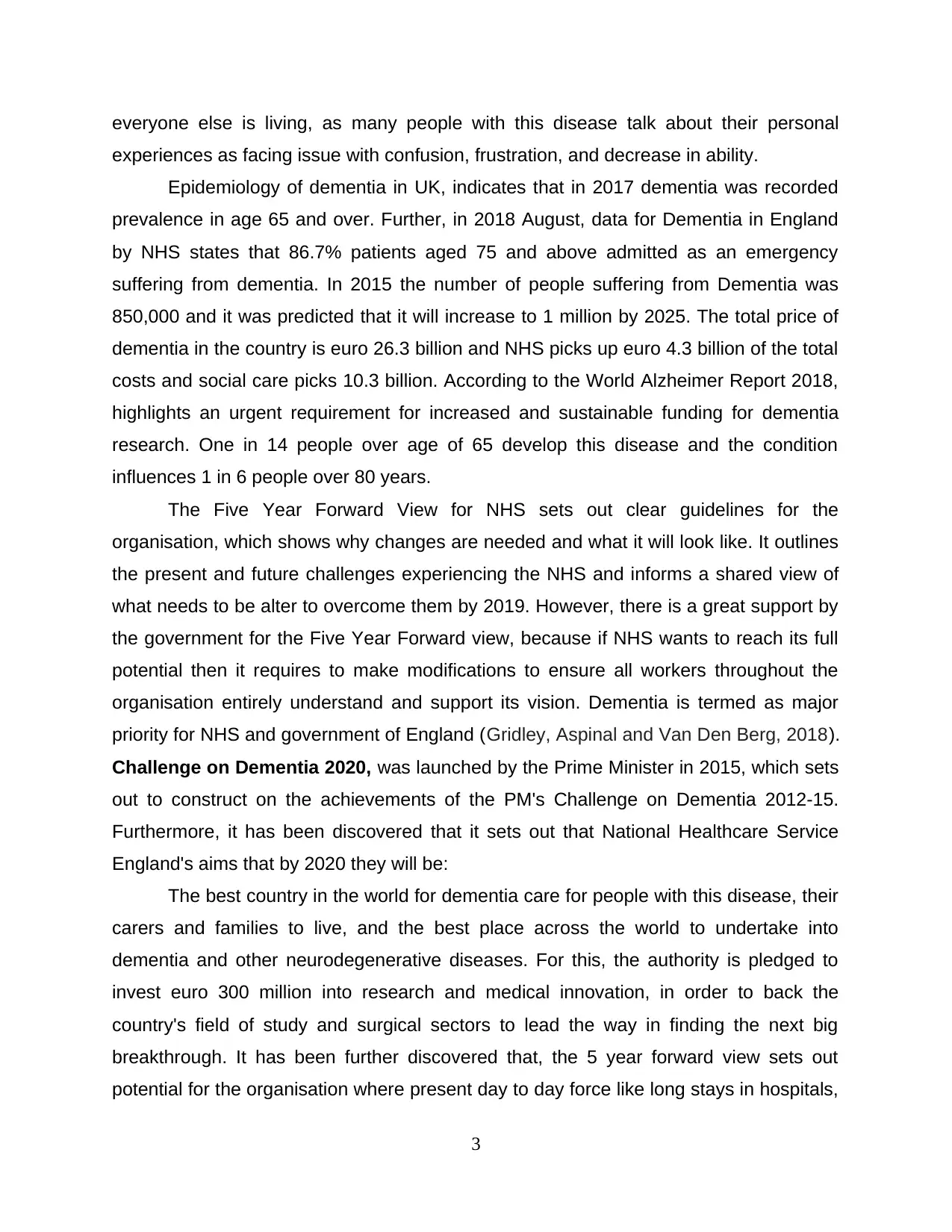
everyone else is living, as many people with this disease talk about their personal
experiences as facing issue with confusion, frustration, and decrease in ability.
Epidemiology of dementia in UK, indicates that in 2017 dementia was recorded
prevalence in age 65 and over. Further, in 2018 August, data for Dementia in England
by NHS states that 86.7% patients aged 75 and above admitted as an emergency
suffering from dementia. In 2015 the number of people suffering from Dementia was
850,000 and it was predicted that it will increase to 1 million by 2025. The total price of
dementia in the country is euro 26.3 billion and NHS picks up euro 4.3 billion of the total
costs and social care picks 10.3 billion. According to the World Alzheimer Report 2018,
highlights an urgent requirement for increased and sustainable funding for dementia
research. One in 14 people over age of 65 develop this disease and the condition
influences 1 in 6 people over 80 years.
The Five Year Forward View for NHS sets out clear guidelines for the
organisation, which shows why changes are needed and what it will look like. It outlines
the present and future challenges experiencing the NHS and informs a shared view of
what needs to be alter to overcome them by 2019. However, there is a great support by
the government for the Five Year Forward view, because if NHS wants to reach its full
potential then it requires to make modifications to ensure all workers throughout the
organisation entirely understand and support its vision. Dementia is termed as major
priority for NHS and government of England (Gridley, Aspinal and Van Den Berg, 2018).
Challenge on Dementia 2020, was launched by the Prime Minister in 2015, which sets
out to construct on the achievements of the PM's Challenge on Dementia 2012-15.
Furthermore, it has been discovered that it sets out that National Healthcare Service
England's aims that by 2020 they will be:
The best country in the world for dementia care for people with this disease, their
carers and families to live, and the best place across the world to undertake into
dementia and other neurodegenerative diseases. For this, the authority is pledged to
invest euro 300 million into research and medical innovation, in order to back the
country's field of study and surgical sectors to lead the way in finding the next big
breakthrough. It has been further discovered that, the 5 year forward view sets out
potential for the organisation where present day to day force like long stays in hospitals,
3
experiences as facing issue with confusion, frustration, and decrease in ability.
Epidemiology of dementia in UK, indicates that in 2017 dementia was recorded
prevalence in age 65 and over. Further, in 2018 August, data for Dementia in England
by NHS states that 86.7% patients aged 75 and above admitted as an emergency
suffering from dementia. In 2015 the number of people suffering from Dementia was
850,000 and it was predicted that it will increase to 1 million by 2025. The total price of
dementia in the country is euro 26.3 billion and NHS picks up euro 4.3 billion of the total
costs and social care picks 10.3 billion. According to the World Alzheimer Report 2018,
highlights an urgent requirement for increased and sustainable funding for dementia
research. One in 14 people over age of 65 develop this disease and the condition
influences 1 in 6 people over 80 years.
The Five Year Forward View for NHS sets out clear guidelines for the
organisation, which shows why changes are needed and what it will look like. It outlines
the present and future challenges experiencing the NHS and informs a shared view of
what needs to be alter to overcome them by 2019. However, there is a great support by
the government for the Five Year Forward view, because if NHS wants to reach its full
potential then it requires to make modifications to ensure all workers throughout the
organisation entirely understand and support its vision. Dementia is termed as major
priority for NHS and government of England (Gridley, Aspinal and Van Den Berg, 2018).
Challenge on Dementia 2020, was launched by the Prime Minister in 2015, which sets
out to construct on the achievements of the PM's Challenge on Dementia 2012-15.
Furthermore, it has been discovered that it sets out that National Healthcare Service
England's aims that by 2020 they will be:
The best country in the world for dementia care for people with this disease, their
carers and families to live, and the best place across the world to undertake into
dementia and other neurodegenerative diseases. For this, the authority is pledged to
invest euro 300 million into research and medical innovation, in order to back the
country's field of study and surgical sectors to lead the way in finding the next big
breakthrough. It has been further discovered that, the 5 year forward view sets out
potential for the organisation where present day to day force like long stays in hospitals,
3
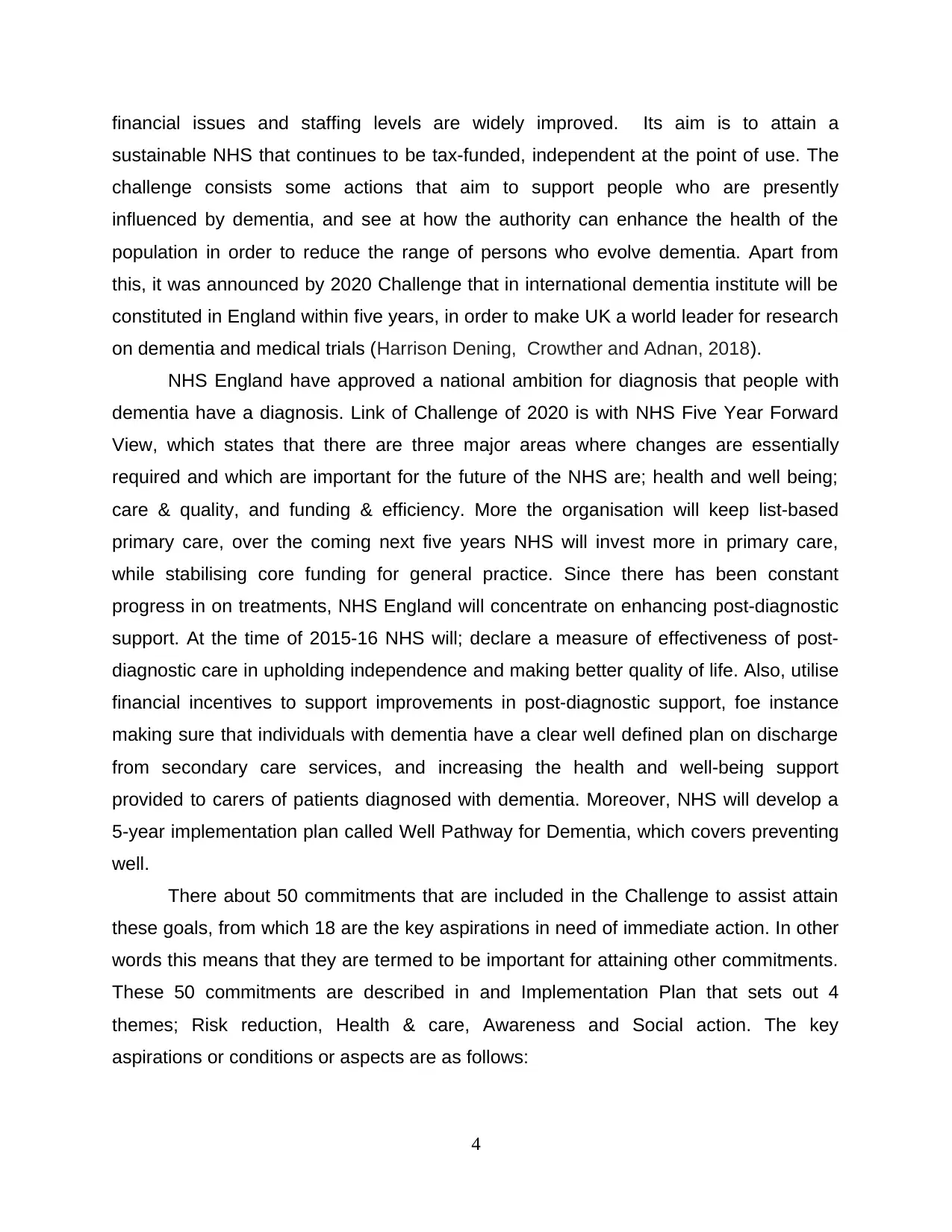
financial issues and staffing levels are widely improved. Its aim is to attain a
sustainable NHS that continues to be tax-funded, independent at the point of use. The
challenge consists some actions that aim to support people who are presently
influenced by dementia, and see at how the authority can enhance the health of the
population in order to reduce the range of persons who evolve dementia. Apart from
this, it was announced by 2020 Challenge that in international dementia institute will be
constituted in England within five years, in order to make UK a world leader for research
on dementia and medical trials (Harrison Dening, Crowther and Adnan, 2018).
NHS England have approved a national ambition for diagnosis that people with
dementia have a diagnosis. Link of Challenge of 2020 is with NHS Five Year Forward
View, which states that there are three major areas where changes are essentially
required and which are important for the future of the NHS are; health and well being;
care & quality, and funding & efficiency. More the organisation will keep list-based
primary care, over the coming next five years NHS will invest more in primary care,
while stabilising core funding for general practice. Since there has been constant
progress in on treatments, NHS England will concentrate on enhancing post-diagnostic
support. At the time of 2015-16 NHS will; declare a measure of effectiveness of post-
diagnostic care in upholding independence and making better quality of life. Also, utilise
financial incentives to support improvements in post-diagnostic support, foe instance
making sure that individuals with dementia have a clear well defined plan on discharge
from secondary care services, and increasing the health and well-being support
provided to carers of patients diagnosed with dementia. Moreover, NHS will develop a
5-year implementation plan called Well Pathway for Dementia, which covers preventing
well.
There about 50 commitments that are included in the Challenge to assist attain
these goals, from which 18 are the key aspirations in need of immediate action. In other
words this means that they are termed to be important for attaining other commitments.
These 50 commitments are described in and Implementation Plan that sets out 4
themes; Risk reduction, Health & care, Awareness and Social action. The key
aspirations or conditions or aspects are as follows:
4
sustainable NHS that continues to be tax-funded, independent at the point of use. The
challenge consists some actions that aim to support people who are presently
influenced by dementia, and see at how the authority can enhance the health of the
population in order to reduce the range of persons who evolve dementia. Apart from
this, it was announced by 2020 Challenge that in international dementia institute will be
constituted in England within five years, in order to make UK a world leader for research
on dementia and medical trials (Harrison Dening, Crowther and Adnan, 2018).
NHS England have approved a national ambition for diagnosis that people with
dementia have a diagnosis. Link of Challenge of 2020 is with NHS Five Year Forward
View, which states that there are three major areas where changes are essentially
required and which are important for the future of the NHS are; health and well being;
care & quality, and funding & efficiency. More the organisation will keep list-based
primary care, over the coming next five years NHS will invest more in primary care,
while stabilising core funding for general practice. Since there has been constant
progress in on treatments, NHS England will concentrate on enhancing post-diagnostic
support. At the time of 2015-16 NHS will; declare a measure of effectiveness of post-
diagnostic care in upholding independence and making better quality of life. Also, utilise
financial incentives to support improvements in post-diagnostic support, foe instance
making sure that individuals with dementia have a clear well defined plan on discharge
from secondary care services, and increasing the health and well-being support
provided to carers of patients diagnosed with dementia. Moreover, NHS will develop a
5-year implementation plan called Well Pathway for Dementia, which covers preventing
well.
There about 50 commitments that are included in the Challenge to assist attain
these goals, from which 18 are the key aspirations in need of immediate action. In other
words this means that they are termed to be important for attaining other commitments.
These 50 commitments are described in and Implementation Plan that sets out 4
themes; Risk reduction, Health & care, Awareness and Social action. The key
aspirations or conditions or aspects are as follows:
4
⊘ This is a preview!⊘
Do you want full access?
Subscribe today to unlock all pages.

Trusted by 1+ million students worldwide
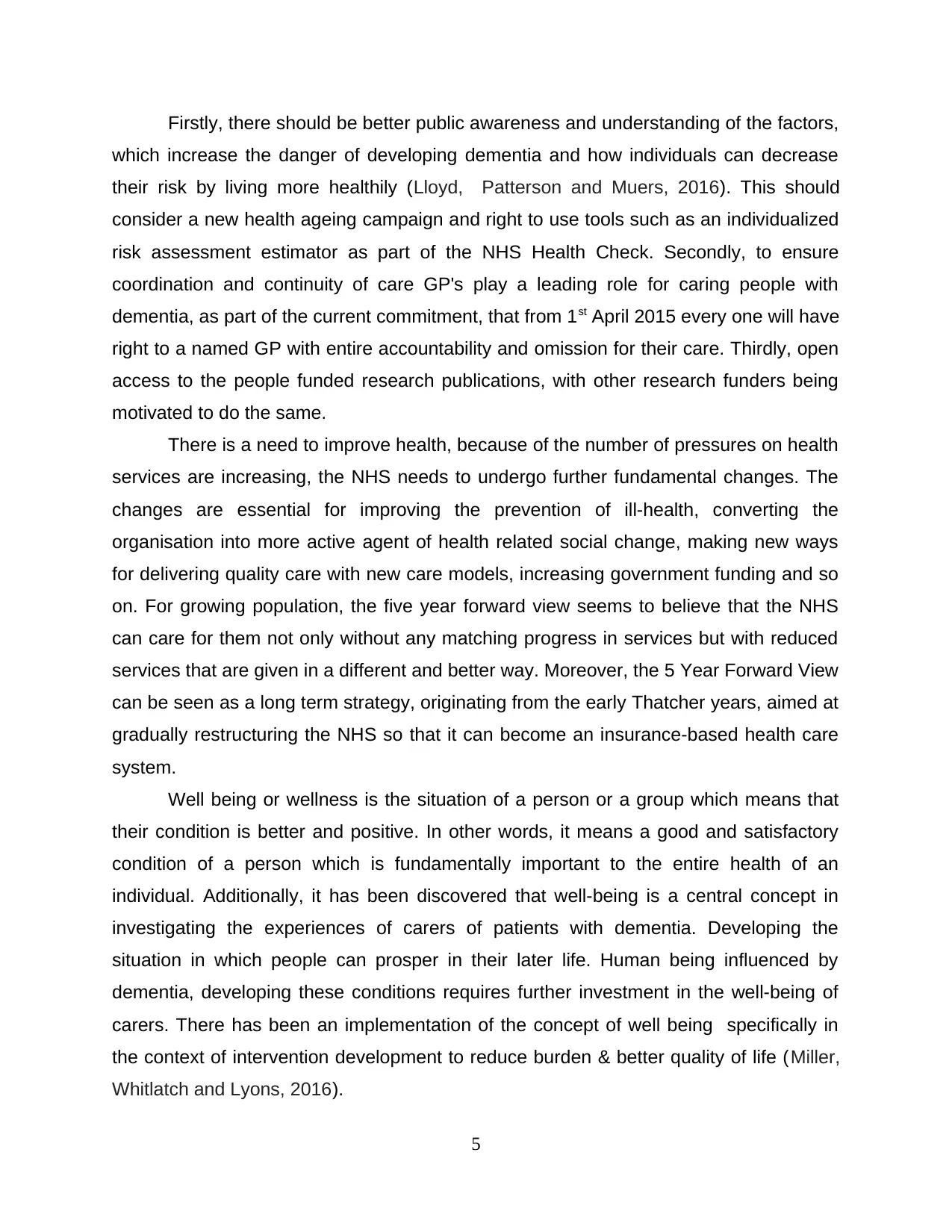
Firstly, there should be better public awareness and understanding of the factors,
which increase the danger of developing dementia and how individuals can decrease
their risk by living more healthily (Lloyd, Patterson and Muers, 2016). This should
consider a new health ageing campaign and right to use tools such as an individualized
risk assessment estimator as part of the NHS Health Check. Secondly, to ensure
coordination and continuity of care GP's play a leading role for caring people with
dementia, as part of the current commitment, that from 1st April 2015 every one will have
right to a named GP with entire accountability and omission for their care. Thirdly, open
access to the people funded research publications, with other research funders being
motivated to do the same.
There is a need to improve health, because of the number of pressures on health
services are increasing, the NHS needs to undergo further fundamental changes. The
changes are essential for improving the prevention of ill-health, converting the
organisation into more active agent of health related social change, making new ways
for delivering quality care with new care models, increasing government funding and so
on. For growing population, the five year forward view seems to believe that the NHS
can care for them not only without any matching progress in services but with reduced
services that are given in a different and better way. Moreover, the 5 Year Forward View
can be seen as a long term strategy, originating from the early Thatcher years, aimed at
gradually restructuring the NHS so that it can become an insurance-based health care
system.
Well being or wellness is the situation of a person or a group which means that
their condition is better and positive. In other words, it means a good and satisfactory
condition of a person which is fundamentally important to the entire health of an
individual. Additionally, it has been discovered that well-being is a central concept in
investigating the experiences of carers of patients with dementia. Developing the
situation in which people can prosper in their later life. Human being influenced by
dementia, developing these conditions requires further investment in the well-being of
carers. There has been an implementation of the concept of well being specifically in
the context of intervention development to reduce burden & better quality of life (Miller,
Whitlatch and Lyons, 2016).
5
which increase the danger of developing dementia and how individuals can decrease
their risk by living more healthily (Lloyd, Patterson and Muers, 2016). This should
consider a new health ageing campaign and right to use tools such as an individualized
risk assessment estimator as part of the NHS Health Check. Secondly, to ensure
coordination and continuity of care GP's play a leading role for caring people with
dementia, as part of the current commitment, that from 1st April 2015 every one will have
right to a named GP with entire accountability and omission for their care. Thirdly, open
access to the people funded research publications, with other research funders being
motivated to do the same.
There is a need to improve health, because of the number of pressures on health
services are increasing, the NHS needs to undergo further fundamental changes. The
changes are essential for improving the prevention of ill-health, converting the
organisation into more active agent of health related social change, making new ways
for delivering quality care with new care models, increasing government funding and so
on. For growing population, the five year forward view seems to believe that the NHS
can care for them not only without any matching progress in services but with reduced
services that are given in a different and better way. Moreover, the 5 Year Forward View
can be seen as a long term strategy, originating from the early Thatcher years, aimed at
gradually restructuring the NHS so that it can become an insurance-based health care
system.
Well being or wellness is the situation of a person or a group which means that
their condition is better and positive. In other words, it means a good and satisfactory
condition of a person which is fundamentally important to the entire health of an
individual. Additionally, it has been discovered that well-being is a central concept in
investigating the experiences of carers of patients with dementia. Developing the
situation in which people can prosper in their later life. Human being influenced by
dementia, developing these conditions requires further investment in the well-being of
carers. There has been an implementation of the concept of well being specifically in
the context of intervention development to reduce burden & better quality of life (Miller,
Whitlatch and Lyons, 2016).
5
Paraphrase This Document
Need a fresh take? Get an instant paraphrase of this document with our AI Paraphraser
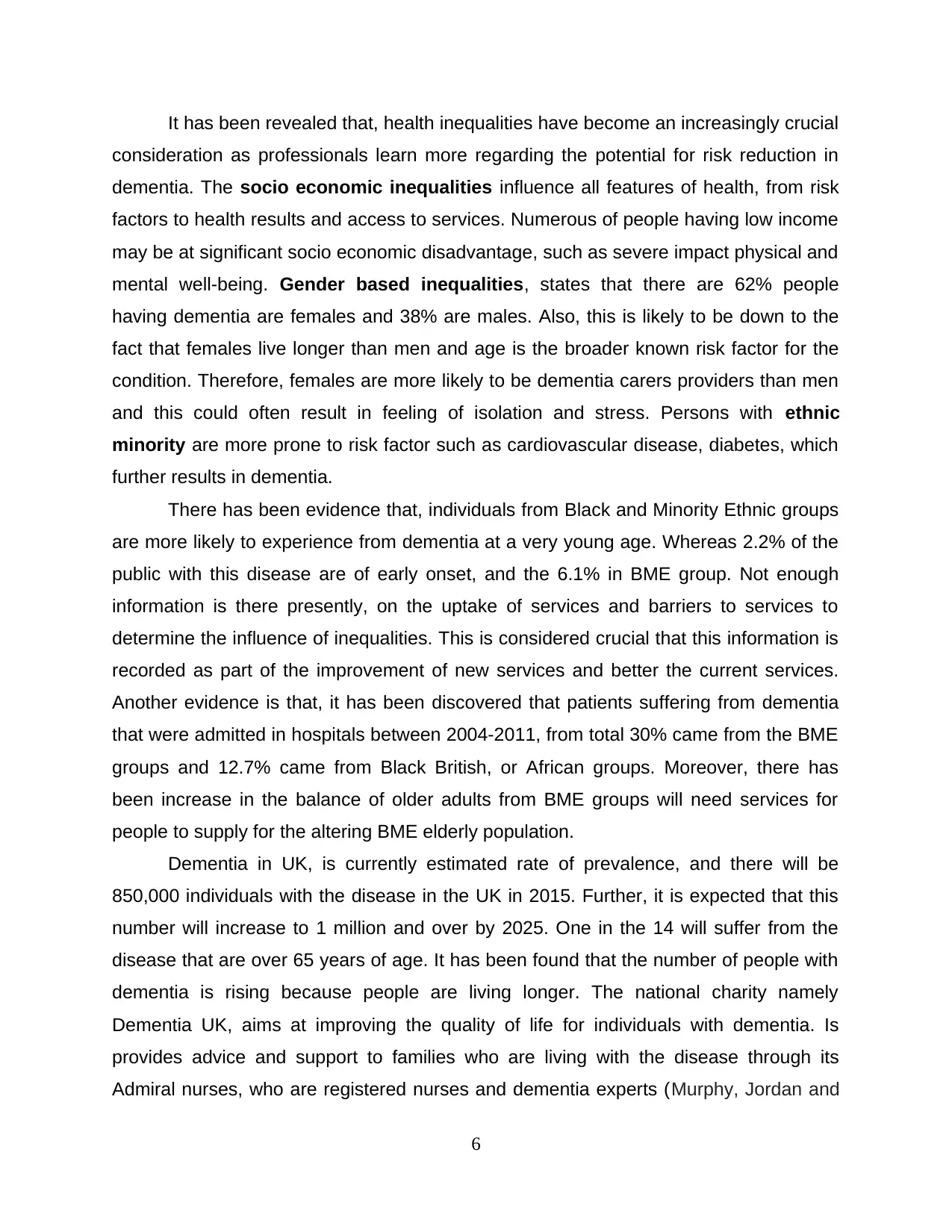
It has been revealed that, health inequalities have become an increasingly crucial
consideration as professionals learn more regarding the potential for risk reduction in
dementia. The socio economic inequalities influence all features of health, from risk
factors to health results and access to services. Numerous of people having low income
may be at significant socio economic disadvantage, such as severe impact physical and
mental well-being. Gender based inequalities, states that there are 62% people
having dementia are females and 38% are males. Also, this is likely to be down to the
fact that females live longer than men and age is the broader known risk factor for the
condition. Therefore, females are more likely to be dementia carers providers than men
and this could often result in feeling of isolation and stress. Persons with ethnic
minority are more prone to risk factor such as cardiovascular disease, diabetes, which
further results in dementia.
There has been evidence that, individuals from Black and Minority Ethnic groups
are more likely to experience from dementia at a very young age. Whereas 2.2% of the
public with this disease are of early onset, and the 6.1% in BME group. Not enough
information is there presently, on the uptake of services and barriers to services to
determine the influence of inequalities. This is considered crucial that this information is
recorded as part of the improvement of new services and better the current services.
Another evidence is that, it has been discovered that patients suffering from dementia
that were admitted in hospitals between 2004-2011, from total 30% came from the BME
groups and 12.7% came from Black British, or African groups. Moreover, there has
been increase in the balance of older adults from BME groups will need services for
people to supply for the altering BME elderly population.
Dementia in UK, is currently estimated rate of prevalence, and there will be
850,000 individuals with the disease in the UK in 2015. Further, it is expected that this
number will increase to 1 million and over by 2025. One in the 14 will suffer from the
disease that are over 65 years of age. It has been found that the number of people with
dementia is rising because people are living longer. The national charity namely
Dementia UK, aims at improving the quality of life for individuals with dementia. Is
provides advice and support to families who are living with the disease through its
Admiral nurses, who are registered nurses and dementia experts (Murphy, Jordan and
6
consideration as professionals learn more regarding the potential for risk reduction in
dementia. The socio economic inequalities influence all features of health, from risk
factors to health results and access to services. Numerous of people having low income
may be at significant socio economic disadvantage, such as severe impact physical and
mental well-being. Gender based inequalities, states that there are 62% people
having dementia are females and 38% are males. Also, this is likely to be down to the
fact that females live longer than men and age is the broader known risk factor for the
condition. Therefore, females are more likely to be dementia carers providers than men
and this could often result in feeling of isolation and stress. Persons with ethnic
minority are more prone to risk factor such as cardiovascular disease, diabetes, which
further results in dementia.
There has been evidence that, individuals from Black and Minority Ethnic groups
are more likely to experience from dementia at a very young age. Whereas 2.2% of the
public with this disease are of early onset, and the 6.1% in BME group. Not enough
information is there presently, on the uptake of services and barriers to services to
determine the influence of inequalities. This is considered crucial that this information is
recorded as part of the improvement of new services and better the current services.
Another evidence is that, it has been discovered that patients suffering from dementia
that were admitted in hospitals between 2004-2011, from total 30% came from the BME
groups and 12.7% came from Black British, or African groups. Moreover, there has
been increase in the balance of older adults from BME groups will need services for
people to supply for the altering BME elderly population.
Dementia in UK, is currently estimated rate of prevalence, and there will be
850,000 individuals with the disease in the UK in 2015. Further, it is expected that this
number will increase to 1 million and over by 2025. One in the 14 will suffer from the
disease that are over 65 years of age. It has been found that the number of people with
dementia is rising because people are living longer. The national charity namely
Dementia UK, aims at improving the quality of life for individuals with dementia. Is
provides advice and support to families who are living with the disease through its
Admiral nurses, who are registered nurses and dementia experts (Murphy, Jordan and
6
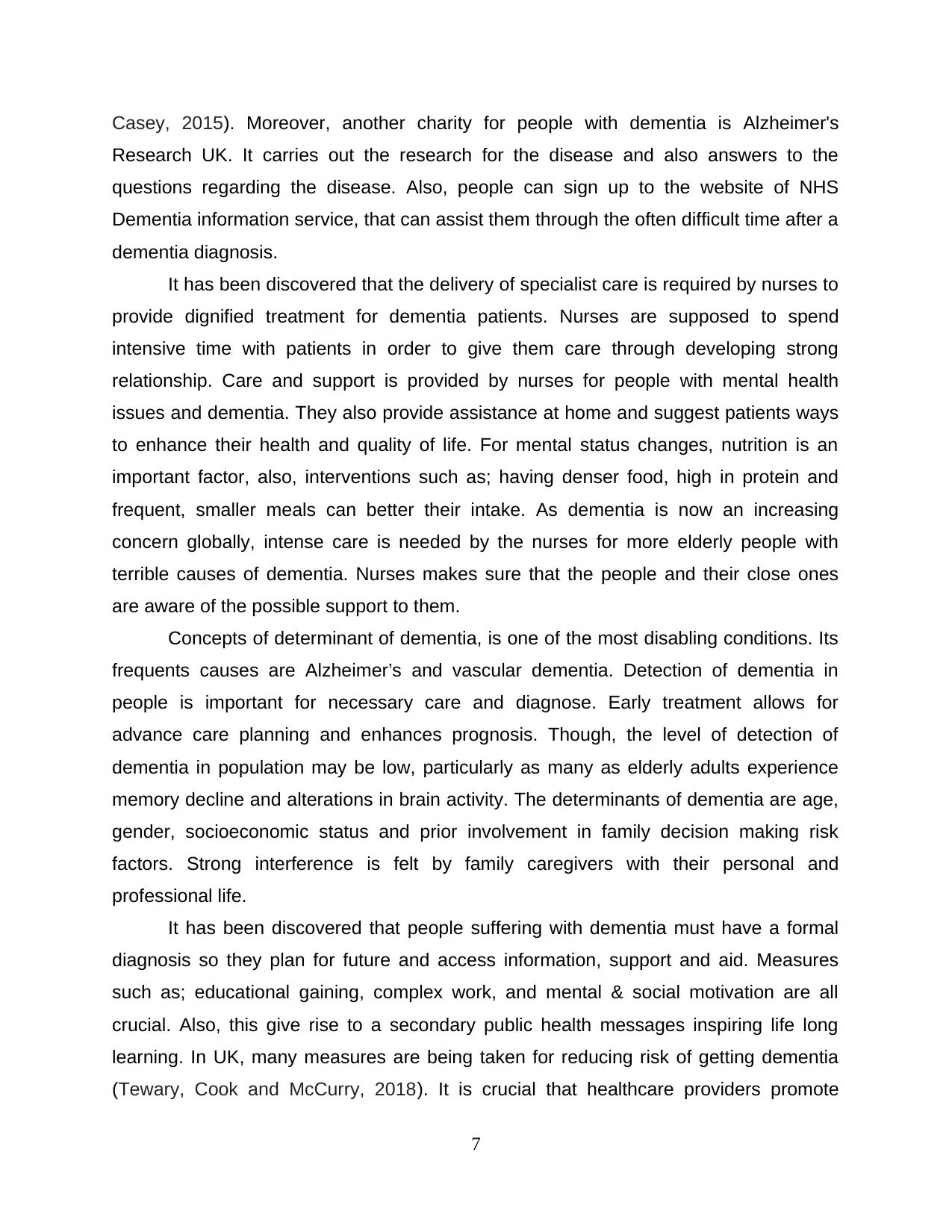
Casey, 2015). Moreover, another charity for people with dementia is Alzheimer's
Research UK. It carries out the research for the disease and also answers to the
questions regarding the disease. Also, people can sign up to the website of NHS
Dementia information service, that can assist them through the often difficult time after a
dementia diagnosis.
It has been discovered that the delivery of specialist care is required by nurses to
provide dignified treatment for dementia patients. Nurses are supposed to spend
intensive time with patients in order to give them care through developing strong
relationship. Care and support is provided by nurses for people with mental health
issues and dementia. They also provide assistance at home and suggest patients ways
to enhance their health and quality of life. For mental status changes, nutrition is an
important factor, also, interventions such as; having denser food, high in protein and
frequent, smaller meals can better their intake. As dementia is now an increasing
concern globally, intense care is needed by the nurses for more elderly people with
terrible causes of dementia. Nurses makes sure that the people and their close ones
are aware of the possible support to them.
Concepts of determinant of dementia, is one of the most disabling conditions. Its
frequents causes are Alzheimer’s and vascular dementia. Detection of dementia in
people is important for necessary care and diagnose. Early treatment allows for
advance care planning and enhances prognosis. Though, the level of detection of
dementia in population may be low, particularly as many as elderly adults experience
memory decline and alterations in brain activity. The determinants of dementia are age,
gender, socioeconomic status and prior involvement in family decision making risk
factors. Strong interference is felt by family caregivers with their personal and
professional life.
It has been discovered that people suffering with dementia must have a formal
diagnosis so they plan for future and access information, support and aid. Measures
such as; educational gaining, complex work, and mental & social motivation are all
crucial. Also, this give rise to a secondary public health messages inspiring life long
learning. In UK, many measures are being taken for reducing risk of getting dementia
(Tewary, Cook and McCurry, 2018). It is crucial that healthcare providers promote
7
Research UK. It carries out the research for the disease and also answers to the
questions regarding the disease. Also, people can sign up to the website of NHS
Dementia information service, that can assist them through the often difficult time after a
dementia diagnosis.
It has been discovered that the delivery of specialist care is required by nurses to
provide dignified treatment for dementia patients. Nurses are supposed to spend
intensive time with patients in order to give them care through developing strong
relationship. Care and support is provided by nurses for people with mental health
issues and dementia. They also provide assistance at home and suggest patients ways
to enhance their health and quality of life. For mental status changes, nutrition is an
important factor, also, interventions such as; having denser food, high in protein and
frequent, smaller meals can better their intake. As dementia is now an increasing
concern globally, intense care is needed by the nurses for more elderly people with
terrible causes of dementia. Nurses makes sure that the people and their close ones
are aware of the possible support to them.
Concepts of determinant of dementia, is one of the most disabling conditions. Its
frequents causes are Alzheimer’s and vascular dementia. Detection of dementia in
people is important for necessary care and diagnose. Early treatment allows for
advance care planning and enhances prognosis. Though, the level of detection of
dementia in population may be low, particularly as many as elderly adults experience
memory decline and alterations in brain activity. The determinants of dementia are age,
gender, socioeconomic status and prior involvement in family decision making risk
factors. Strong interference is felt by family caregivers with their personal and
professional life.
It has been discovered that people suffering with dementia must have a formal
diagnosis so they plan for future and access information, support and aid. Measures
such as; educational gaining, complex work, and mental & social motivation are all
crucial. Also, this give rise to a secondary public health messages inspiring life long
learning. In UK, many measures are being taken for reducing risk of getting dementia
(Tewary, Cook and McCurry, 2018). It is crucial that healthcare providers promote
7
⊘ This is a preview!⊘
Do you want full access?
Subscribe today to unlock all pages.

Trusted by 1+ million students worldwide
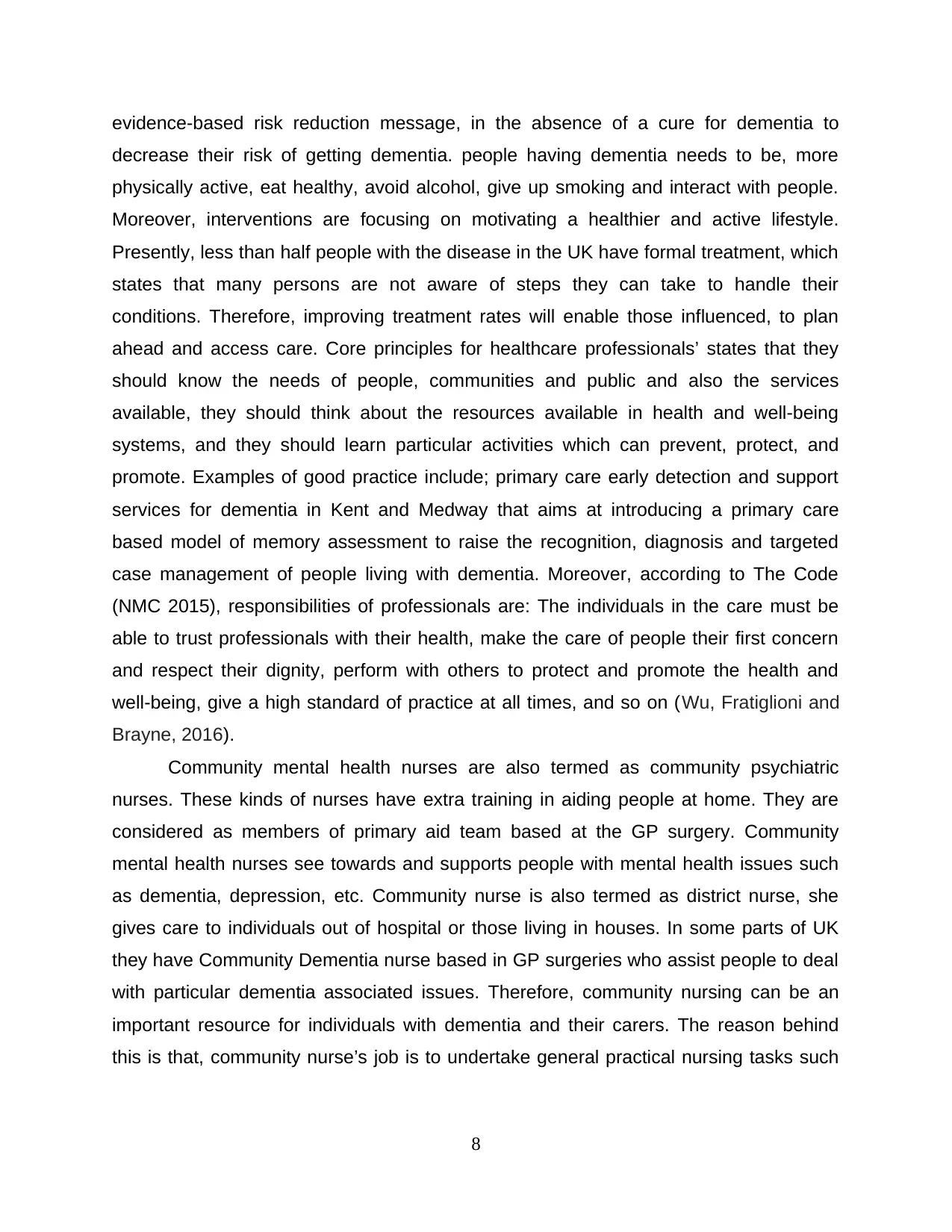
evidence-based risk reduction message, in the absence of a cure for dementia to
decrease their risk of getting dementia. people having dementia needs to be, more
physically active, eat healthy, avoid alcohol, give up smoking and interact with people.
Moreover, interventions are focusing on motivating a healthier and active lifestyle.
Presently, less than half people with the disease in the UK have formal treatment, which
states that many persons are not aware of steps they can take to handle their
conditions. Therefore, improving treatment rates will enable those influenced, to plan
ahead and access care. Core principles for healthcare professionals’ states that they
should know the needs of people, communities and public and also the services
available, they should think about the resources available in health and well-being
systems, and they should learn particular activities which can prevent, protect, and
promote. Examples of good practice include; primary care early detection and support
services for dementia in Kent and Medway that aims at introducing a primary care
based model of memory assessment to raise the recognition, diagnosis and targeted
case management of people living with dementia. Moreover, according to The Code
(NMC 2015), responsibilities of professionals are: The individuals in the care must be
able to trust professionals with their health, make the care of people their first concern
and respect their dignity, perform with others to protect and promote the health and
well-being, give a high standard of practice at all times, and so on (Wu, Fratiglioni and
Brayne, 2016).
Community mental health nurses are also termed as community psychiatric
nurses. These kinds of nurses have extra training in aiding people at home. They are
considered as members of primary aid team based at the GP surgery. Community
mental health nurses see towards and supports people with mental health issues such
as dementia, depression, etc. Community nurse is also termed as district nurse, she
gives care to individuals out of hospital or those living in houses. In some parts of UK
they have Community Dementia nurse based in GP surgeries who assist people to deal
with particular dementia associated issues. Therefore, community nursing can be an
important resource for individuals with dementia and their carers. The reason behind
this is that, community nurse’s job is to undertake general practical nursing tasks such
8
decrease their risk of getting dementia. people having dementia needs to be, more
physically active, eat healthy, avoid alcohol, give up smoking and interact with people.
Moreover, interventions are focusing on motivating a healthier and active lifestyle.
Presently, less than half people with the disease in the UK have formal treatment, which
states that many persons are not aware of steps they can take to handle their
conditions. Therefore, improving treatment rates will enable those influenced, to plan
ahead and access care. Core principles for healthcare professionals’ states that they
should know the needs of people, communities and public and also the services
available, they should think about the resources available in health and well-being
systems, and they should learn particular activities which can prevent, protect, and
promote. Examples of good practice include; primary care early detection and support
services for dementia in Kent and Medway that aims at introducing a primary care
based model of memory assessment to raise the recognition, diagnosis and targeted
case management of people living with dementia. Moreover, according to The Code
(NMC 2015), responsibilities of professionals are: The individuals in the care must be
able to trust professionals with their health, make the care of people their first concern
and respect their dignity, perform with others to protect and promote the health and
well-being, give a high standard of practice at all times, and so on (Wu, Fratiglioni and
Brayne, 2016).
Community mental health nurses are also termed as community psychiatric
nurses. These kinds of nurses have extra training in aiding people at home. They are
considered as members of primary aid team based at the GP surgery. Community
mental health nurses see towards and supports people with mental health issues such
as dementia, depression, etc. Community nurse is also termed as district nurse, she
gives care to individuals out of hospital or those living in houses. In some parts of UK
they have Community Dementia nurse based in GP surgeries who assist people to deal
with particular dementia associated issues. Therefore, community nursing can be an
important resource for individuals with dementia and their carers. The reason behind
this is that, community nurse’s job is to undertake general practical nursing tasks such
8
Paraphrase This Document
Need a fresh take? Get an instant paraphrase of this document with our AI Paraphraser
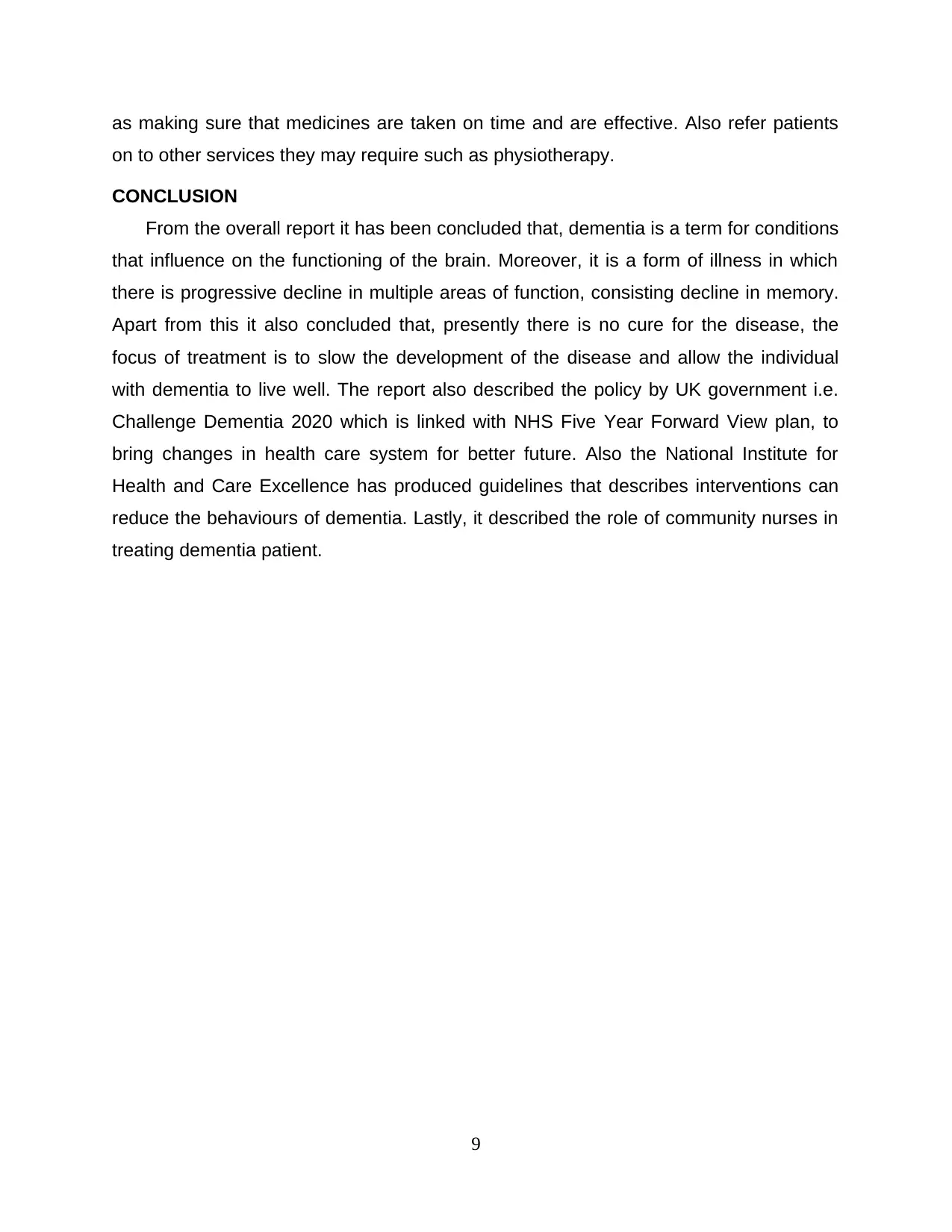
as making sure that medicines are taken on time and are effective. Also refer patients
on to other services they may require such as physiotherapy.
CONCLUSION
From the overall report it has been concluded that, dementia is a term for conditions
that influence on the functioning of the brain. Moreover, it is a form of illness in which
there is progressive decline in multiple areas of function, consisting decline in memory.
Apart from this it also concluded that, presently there is no cure for the disease, the
focus of treatment is to slow the development of the disease and allow the individual
with dementia to live well. The report also described the policy by UK government i.e.
Challenge Dementia 2020 which is linked with NHS Five Year Forward View plan, to
bring changes in health care system for better future. Also the National Institute for
Health and Care Excellence has produced guidelines that describes interventions can
reduce the behaviours of dementia. Lastly, it described the role of community nurses in
treating dementia patient.
9
on to other services they may require such as physiotherapy.
CONCLUSION
From the overall report it has been concluded that, dementia is a term for conditions
that influence on the functioning of the brain. Moreover, it is a form of illness in which
there is progressive decline in multiple areas of function, consisting decline in memory.
Apart from this it also concluded that, presently there is no cure for the disease, the
focus of treatment is to slow the development of the disease and allow the individual
with dementia to live well. The report also described the policy by UK government i.e.
Challenge Dementia 2020 which is linked with NHS Five Year Forward View plan, to
bring changes in health care system for better future. Also the National Institute for
Health and Care Excellence has produced guidelines that describes interventions can
reduce the behaviours of dementia. Lastly, it described the role of community nurses in
treating dementia patient.
9
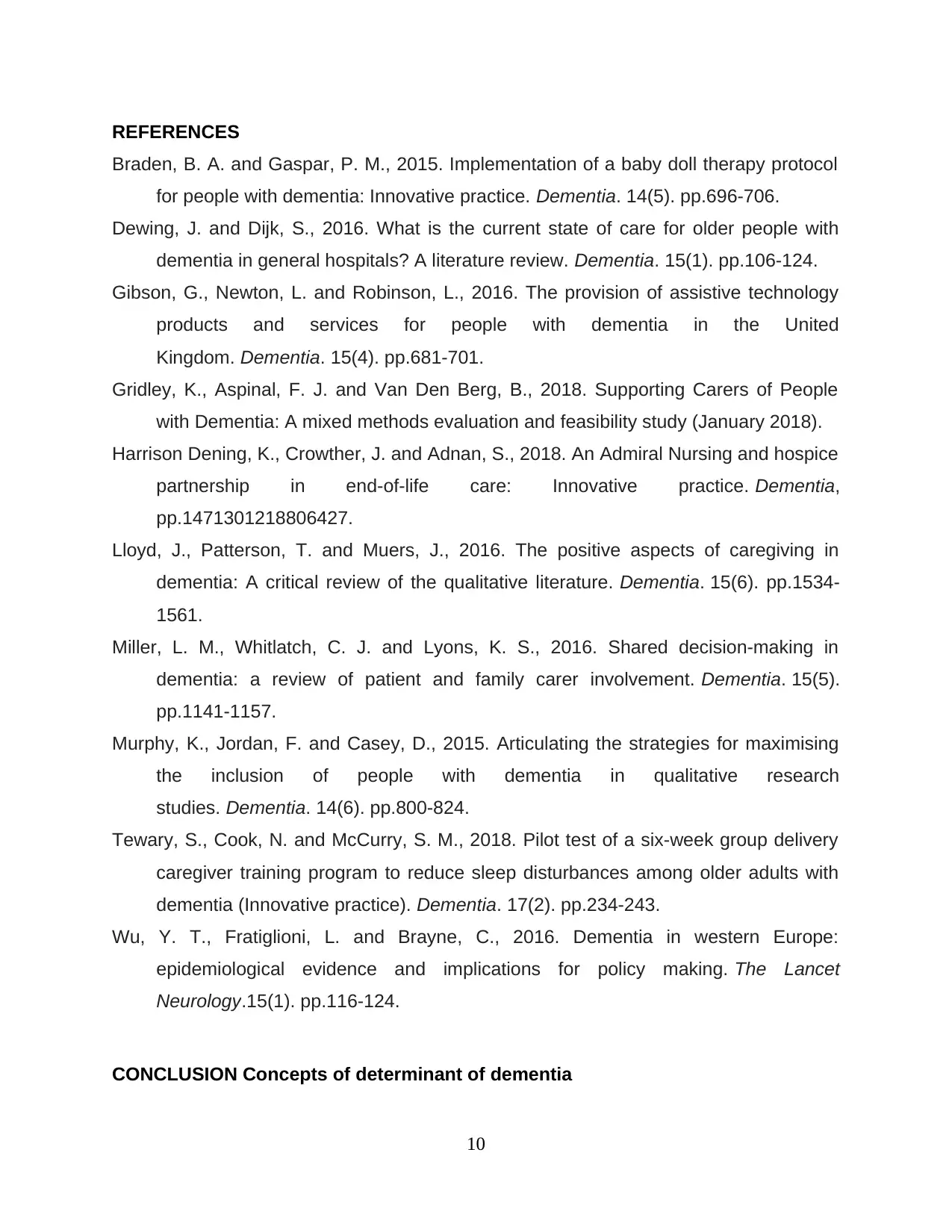
REFERENCES
Braden, B. A. and Gaspar, P. M., 2015. Implementation of a baby doll therapy protocol
for people with dementia: Innovative practice. Dementia. 14(5). pp.696-706.
Dewing, J. and Dijk, S., 2016. What is the current state of care for older people with
dementia in general hospitals? A literature review. Dementia. 15(1). pp.106-124.
Gibson, G., Newton, L. and Robinson, L., 2016. The provision of assistive technology
products and services for people with dementia in the United
Kingdom. Dementia. 15(4). pp.681-701.
Gridley, K., Aspinal, F. J. and Van Den Berg, B., 2018. Supporting Carers of People
with Dementia: A mixed methods evaluation and feasibility study (January 2018).
Harrison Dening, K., Crowther, J. and Adnan, S., 2018. An Admiral Nursing and hospice
partnership in end-of-life care: Innovative practice. Dementia,
pp.1471301218806427.
Lloyd, J., Patterson, T. and Muers, J., 2016. The positive aspects of caregiving in
dementia: A critical review of the qualitative literature. Dementia. 15(6). pp.1534-
1561.
Miller, L. M., Whitlatch, C. J. and Lyons, K. S., 2016. Shared decision-making in
dementia: a review of patient and family carer involvement. Dementia. 15(5).
pp.1141-1157.
Murphy, K., Jordan, F. and Casey, D., 2015. Articulating the strategies for maximising
the inclusion of people with dementia in qualitative research
studies. Dementia. 14(6). pp.800-824.
Tewary, S., Cook, N. and McCurry, S. M., 2018. Pilot test of a six-week group delivery
caregiver training program to reduce sleep disturbances among older adults with
dementia (Innovative practice). Dementia. 17(2). pp.234-243.
Wu, Y. T., Fratiglioni, L. and Brayne, C., 2016. Dementia in western Europe:
epidemiological evidence and implications for policy making. The Lancet
Neurology.15(1). pp.116-124.
CONCLUSION Concepts of determinant of dementia
10
Braden, B. A. and Gaspar, P. M., 2015. Implementation of a baby doll therapy protocol
for people with dementia: Innovative practice. Dementia. 14(5). pp.696-706.
Dewing, J. and Dijk, S., 2016. What is the current state of care for older people with
dementia in general hospitals? A literature review. Dementia. 15(1). pp.106-124.
Gibson, G., Newton, L. and Robinson, L., 2016. The provision of assistive technology
products and services for people with dementia in the United
Kingdom. Dementia. 15(4). pp.681-701.
Gridley, K., Aspinal, F. J. and Van Den Berg, B., 2018. Supporting Carers of People
with Dementia: A mixed methods evaluation and feasibility study (January 2018).
Harrison Dening, K., Crowther, J. and Adnan, S., 2018. An Admiral Nursing and hospice
partnership in end-of-life care: Innovative practice. Dementia,
pp.1471301218806427.
Lloyd, J., Patterson, T. and Muers, J., 2016. The positive aspects of caregiving in
dementia: A critical review of the qualitative literature. Dementia. 15(6). pp.1534-
1561.
Miller, L. M., Whitlatch, C. J. and Lyons, K. S., 2016. Shared decision-making in
dementia: a review of patient and family carer involvement. Dementia. 15(5).
pp.1141-1157.
Murphy, K., Jordan, F. and Casey, D., 2015. Articulating the strategies for maximising
the inclusion of people with dementia in qualitative research
studies. Dementia. 14(6). pp.800-824.
Tewary, S., Cook, N. and McCurry, S. M., 2018. Pilot test of a six-week group delivery
caregiver training program to reduce sleep disturbances among older adults with
dementia (Innovative practice). Dementia. 17(2). pp.234-243.
Wu, Y. T., Fratiglioni, L. and Brayne, C., 2016. Dementia in western Europe:
epidemiological evidence and implications for policy making. The Lancet
Neurology.15(1). pp.116-124.
CONCLUSION Concepts of determinant of dementia
10
⊘ This is a preview!⊘
Do you want full access?
Subscribe today to unlock all pages.

Trusted by 1+ million students worldwide
1 out of 12
Related Documents
Your All-in-One AI-Powered Toolkit for Academic Success.
+13062052269
info@desklib.com
Available 24*7 on WhatsApp / Email
![[object Object]](/_next/static/media/star-bottom.7253800d.svg)
Unlock your academic potential
Copyright © 2020–2025 A2Z Services. All Rights Reserved. Developed and managed by ZUCOL.




